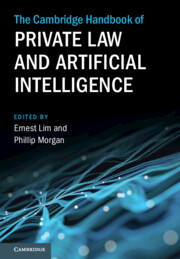Book contents
- The Cambridge Handbook of Private Law and Artificial Intelligence
- Reviews
- The Cambridge Handbook of Private Law and Artificial Intelligence
- Copyright page
- Dedication
- Contents
- Figures
- Table
- Contributors
- Acknowledgements
- Abbreviations
- Introduction
- 1 AI for Lawyers
- 2 Computable Law and AI
- Part I Law of Obligations
- 3 Contract Law and AI
- 4 Self-Driving Contracts and AI
- 5 Consumer Protection Law and AI
- 6 Tort Law and AI
- 7 Automated Vehicle Liability and AI
- 8 Legal Causation and AI
- 9 Product Liability Law and AI
- 10 Appropriation of Personality in the Era of Deepfakes
- 11 Agency Law and AI
- 12 Trust Law and AI
- 13 Unjust Enrichment Law and AI
- Part II Property
- Part III Corporate and Commercial Law
- Part IV Comparative Perspectives
- Index
6 - Tort Law and AI
Vicarious Liability
from Part I - Law of Obligations
Published online by Cambridge University Press: 21 March 2024
- The Cambridge Handbook of Private Law and Artificial Intelligence
- Reviews
- The Cambridge Handbook of Private Law and Artificial Intelligence
- Copyright page
- Dedication
- Contents
- Figures
- Table
- Contributors
- Acknowledgements
- Abbreviations
- Introduction
- 1 AI for Lawyers
- 2 Computable Law and AI
- Part I Law of Obligations
- 3 Contract Law and AI
- 4 Self-Driving Contracts and AI
- 5 Consumer Protection Law and AI
- 6 Tort Law and AI
- 7 Automated Vehicle Liability and AI
- 8 Legal Causation and AI
- 9 Product Liability Law and AI
- 10 Appropriation of Personality in the Era of Deepfakes
- 11 Agency Law and AI
- 12 Trust Law and AI
- 13 Unjust Enrichment Law and AI
- Part II Property
- Part III Corporate and Commercial Law
- Part IV Comparative Perspectives
- Index
Summary
AI will disrupt the existing tort settlement. Tort law should be tech-impartial – that is, it should not encourage or discourage the adoption of new technologies where they generate the same level of risk, and victim rights should not be eroded by the use of new technologies in place of existing systems of work. Existing tort law is poorly suited to address some AI challenges, and a liability gap will emerge as systems replace employees since AI does not have legal personality and cannot commit a tort. A form of AI statutory vicarious liability should apply in commercial settings to address the liability gap and as the tech-impartial solution.
- Type
- Chapter
- Information
- Publisher: Cambridge University PressPrint publication year: 2024

